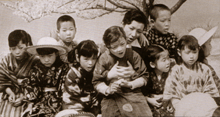In the idyllic, rural Inland Sea island of Shodoshima in 1928, a group of children run towards a laden caravan in order to bid farewell to their kind and affable sensei (teacher) who is leaving the village to be married. A young, motivated teacher named Hisako Oishi (Hideko Takamine) has been recruited from the industrialized side of the island to serve as her replacement, but the villagers are skeptical of Miss Oishi’s suitability for the teaching position in the remote peasant community, observing that the sophisticated and well-educated teacher commutes to the local school on a fast, new bicycle (a rare sight in the poor, working class village) and wears a modern, Western suit. Even the reserved senior teacher (Chishu Ryu) at the elementary school humbly remarks “Why’d they send such a good teacher here? The principal is a funny one.” The novice teacher has been entrusted to the care of twelve first grade students – seven girls and five boys – the innocent and endearing twenty-four eyes who would look to Miss Oishi for guidance during their formative first year of school. The parents are quick to notice Miss Oishi’s unusual teaching style: preferring to address the children using their nicknames, learning about each student’s family, playing outdoor exercises in the open forest, teaching them traditional folksongs instead of prescribed school anthems. Her unorthodox methods generate gossip within the community, a tension that is exacerbated when a storm damages the coastal home of a student named Nita (Kunio Sato), and a lighthearted moment with the children brings the frustrated and desperate ire of another coastal resident. The school days pass uneventfully until one afternoon in the playground when some of the boys decide to play a practical joke on the unsuspecting Miss Oishi and unintentionally cause a disabling injury. In a tender and amusing episode, the children decide to visit Miss Oishi, hungry and ill prepared for the long and physically demanding journey, and the puzzled teacher encounters the children crying uncontrollably as they walk along the bus route to her house. The happy reunion inevitably leads to reconciliation and community acceptance, and a promise to return to the school when she is ambulatory. However, Miss Oishi’s prolonged recuperation prevents her from making the arduous nine mile, 50-minute bicycle trip to the village school. At the urging of her protective mother (Shizue Natsukawa), Miss Oishi reluctantly agrees to transfer to the combined, upper grade elementary school near her home, where she is able to commute by bus. However, Miss Oichi will again reunite with her class five years later, amidst the austerity and toll of a global economic depression, Manchurian conflict, and red scare, as the students, now adolescents graduating from elementary school, struggle to retain hope and optimism in an environment ravaged by poverty, misfortune, increasing militarism, and political uncertainty.
Based on the Sakae Tsuboi novel, Twenty-Four Eyes is a haunting, compassionately realized, and profoundly affecting portrait of humanism, innocence, and the personal toll of war. Filmed from a low camera angle, and using exquisitely composed crane, long, and medium shots, Keisuke Kinoshita visually conveys a sense of distance that, in turn, reflects the innocence of the children’s perspective and the seeming insularity of the villagers: the long bicycle commute; the children’s outdoor activities singing folksongs; Miss Oishi traversing the empty school yard after being admonished for broaching the subject of communism in class. Note the increased frequency of close-up shots as the students leave the nurturing environment of the classroom to face the austerity and turmoil of the outside world, in essence, defining their individuality and character as adults: the encounter with Matsue (Sadako Kusano) at a short order restaurant; the graduation ceremony; the shot of the schoolboys, now enlisted men, marching off to war. The final, bittersweet image shows the beloved, aging sensei, slowly traveling through the inclement weather of the unpopulated, rural countryside, momentarily stopping to allow a bus to pass through the empty road, before resuming her lonely journey home – a poignant reminder of the dignity, perseverance, and tenacity of the human soul against the travails and disillusionment of profound and irrevocable change.
© Acquarello 2002. All rights reserved.
